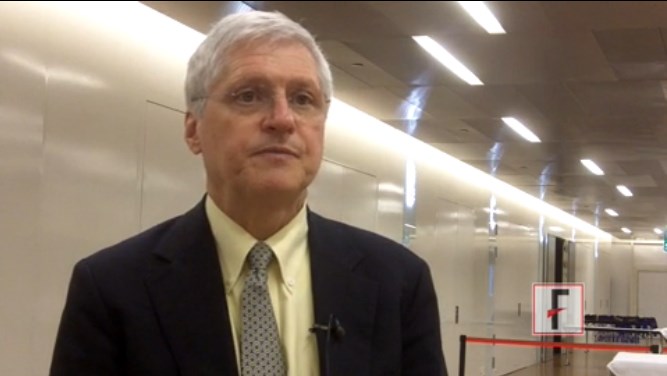User login
VIDEO: TKIs merit broader use as NSCLC adjuvant
GENEVA – It’s time for oncologists to radically expand their use of adjuvant treatment with a tyrosine-kinase inhibitor in patients with stage IB-III non–small cell lung cancer that has a suitable mutation who have undergone surgical resection and received adjuvant chemotherapy along with, when appropriate, adjuvant radiation therapy, Dr. Mark G. Kris said in a video interview at the European Lung Cancer Congress.
Giving such patients prolonged treatment with a tyrosine-kinase inhibitor when their tumor carries a mutation in the epidermal growth factor receptor gene boosts their chance for complete cure, increases survival, and should be much more widely used than it’s been up until now, said Dr. Kris of Memorial Sloan Kettering Cancer Center, New York.
“The time is ripe,” to treat these patients with gefitinib (Iressa), erlotinib (Tarceva), or afatinib (Gilotrif) because they give patients a good prospect for benefit while posing little risk for causing significant adverse effects. More than 100 patients have been documented on treatment with gefitinib for more than 10 years with no concerning adverse effects, Dr. Kris noted. Even though the evidence for the efficacy of these drugs in this setting is not completely airtight with no phase III trial results, the risk-to-benefit ratio “strongly favors” using a tyrosine-kinase inhibitor, he said.
Dr. Kris has been a consultant to AstraZeneca, Roche, Genentech/Roche, Clovis and Novartis, and he has received research grants from Pfizer and Puma.
The video associated with this article is no longer available on this site. Please view all of our videos on the MDedge YouTube channel
On Twitter @mitchelzoler
GENEVA – It’s time for oncologists to radically expand their use of adjuvant treatment with a tyrosine-kinase inhibitor in patients with stage IB-III non–small cell lung cancer that has a suitable mutation who have undergone surgical resection and received adjuvant chemotherapy along with, when appropriate, adjuvant radiation therapy, Dr. Mark G. Kris said in a video interview at the European Lung Cancer Congress.
Giving such patients prolonged treatment with a tyrosine-kinase inhibitor when their tumor carries a mutation in the epidermal growth factor receptor gene boosts their chance for complete cure, increases survival, and should be much more widely used than it’s been up until now, said Dr. Kris of Memorial Sloan Kettering Cancer Center, New York.
“The time is ripe,” to treat these patients with gefitinib (Iressa), erlotinib (Tarceva), or afatinib (Gilotrif) because they give patients a good prospect for benefit while posing little risk for causing significant adverse effects. More than 100 patients have been documented on treatment with gefitinib for more than 10 years with no concerning adverse effects, Dr. Kris noted. Even though the evidence for the efficacy of these drugs in this setting is not completely airtight with no phase III trial results, the risk-to-benefit ratio “strongly favors” using a tyrosine-kinase inhibitor, he said.
Dr. Kris has been a consultant to AstraZeneca, Roche, Genentech/Roche, Clovis and Novartis, and he has received research grants from Pfizer and Puma.
The video associated with this article is no longer available on this site. Please view all of our videos on the MDedge YouTube channel
On Twitter @mitchelzoler
GENEVA – It’s time for oncologists to radically expand their use of adjuvant treatment with a tyrosine-kinase inhibitor in patients with stage IB-III non–small cell lung cancer that has a suitable mutation who have undergone surgical resection and received adjuvant chemotherapy along with, when appropriate, adjuvant radiation therapy, Dr. Mark G. Kris said in a video interview at the European Lung Cancer Congress.
Giving such patients prolonged treatment with a tyrosine-kinase inhibitor when their tumor carries a mutation in the epidermal growth factor receptor gene boosts their chance for complete cure, increases survival, and should be much more widely used than it’s been up until now, said Dr. Kris of Memorial Sloan Kettering Cancer Center, New York.
“The time is ripe,” to treat these patients with gefitinib (Iressa), erlotinib (Tarceva), or afatinib (Gilotrif) because they give patients a good prospect for benefit while posing little risk for causing significant adverse effects. More than 100 patients have been documented on treatment with gefitinib for more than 10 years with no concerning adverse effects, Dr. Kris noted. Even though the evidence for the efficacy of these drugs in this setting is not completely airtight with no phase III trial results, the risk-to-benefit ratio “strongly favors” using a tyrosine-kinase inhibitor, he said.
Dr. Kris has been a consultant to AstraZeneca, Roche, Genentech/Roche, Clovis and Novartis, and he has received research grants from Pfizer and Puma.
The video associated with this article is no longer available on this site. Please view all of our videos on the MDedge YouTube channel
On Twitter @mitchelzoler
EXPERT ANALYSIS FROM ELCC 2015
